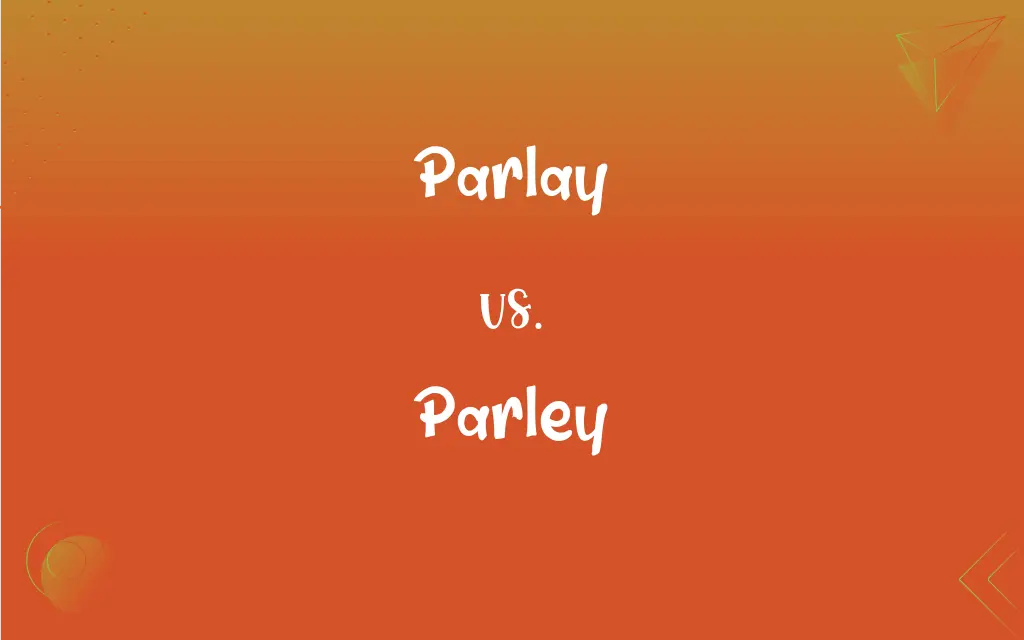Parlay vs. Parley: What's the Difference?
Edited by Aimie Carlson || By Harlon Moss || Updated on October 23, 2023
Parlay is to use success or assets to achieve more, while parley is a discussion between enemies.

Key Differences
Parlay and parley are two English words that are often confused but have distinct meanings. Parlay originates from gambling terminology, where it refers to using one's winnings to make another bet. Essentially, it signifies leveraging an advantage or asset to achieve even more. On the other hand, parley has roots in diplomacy. It denotes a discussion or conversation, especially between opposing sides or enemies, to negotiate or deliberate.
In betting or gambling, to parlay is to reinvest the money one has won from a previous bet into another bet, thereby amplifying the stakes. This method can potentially lead to significant earnings, but it also increases the risk. Parley, however, is unrelated to gambling. Instead, it's often used in contexts of wars or conflicts. When two opposing groups hold a parley, they come together to discuss terms, often trying to reach an agreement or avoid further hostilities.
Furthermore, parlay can also figuratively mean to turn an initial advantage or asset into a greater achievement or benefit. For example, a musician might parlay their initial success into a more significant record deal. Parley, sticking to its roots, remains in the realm of dialogue, especially those of diplomatic or official nature.
In modern usage, parlay has been extended beyond gambling to imply leveraging any advantage in various contexts, like business or personal growth. Parley, in contrast, remains consistent in its meaning, usually associated with formal discussions between parties with differences, aiming for resolution or understanding.
Comparison Chart
Origin
Gambling
Diplomacy
ADVERTISEMENT
Primary Usage
Betting, reinvesting winnings
Discussion or negotiation
Part of Speech
Verb
Noun (can also be a verb in certain contexts)
Figurative Use
Leverage success/asset for more
N/A
Related to
Risks, stakes, amplifying outcomes
Dialogue, resolutions, agreements
Parlay and Parley Definitions
Parlay
To transform a particular situation into a desired outcome.
The manager parlayed the team's underdog status into a motivational tool.
ADVERTISEMENT
Parley
A conference, especially between opposing sides.
The parley at the summit was meant to bring the nations closer.
Parlay
To use one's success or assets to achieve more.
She parlayed her acting skills into a producing role.
Parley
An informal discussion or chat.
They had a quick parley over coffee about the project.
Parlay
To turn an initial advantage into a bigger benefit.
The tech startup parlayed its unique algorithm into a multi-million-dollar deal.
Parley
A conversation or dialogue, especially on serious subjects.
The community held a parley to discuss the new zoning laws.
Parlay
To increase something by building upon it.
The author parlayed her first book's success into a sequel.
Parley
A meeting for discussion or negotiation.
The leaders arranged a parley to resolve their territorial disputes.
Parlay
To bet an amount or outcome and reinvest its winnings.
He decided to parlay his initial bet after winning.
Parley
A discussion between enemies.
The two warring tribes held a parley to discuss peace terms.
Parlay
To bet (an original wager and its winnings) on a subsequent event.
Parley
A discussion or conference, especially one between enemies over terms of truce or other matters.
FAQs
What's the primary origin of parlay?
Gambling.
Is parley primarily a verb or noun?
It's primarily a noun but can also be used as a verb.
Can parlay be used outside of gambling contexts?
Yes, it can mean leveraging any advantage in various situations.
Can one parlay skills?
Yes, one can use skills as a base to gain further benefits or opportunities.
Can you parlay in business?
Yes, businesses can leverage their assets or advantages for more significant benefits.
Is a parley always between opposing sides?
Often, but it can also be a general discussion or conversation.
Can parlay be used as a noun?
Yes, but it's more commonly used as a verb.
How does a parlay bet work?
It involves reinvesting winnings from one bet into another.
Are parley discussions always formal?
They are often formal but can also be informal.
Is to parlay a risk?
Yes, because it involves increasing stakes based on prior success.
Can you parley a bet?
No, you parlay a bet. You can have a parley to discuss something.
What's a synonym for parley?
Discussion or negotiation.
Who typically engages in a parley during wars?
Leaders or representatives of the opposing sides.
Can you give an example of parlaying an opportunity?
An artist parlaying a hit single into a larger record deal.
Can a business parlay its success?
Yes, it can leverage its success for further growth or opportunities.
Is parley related to gambling?
No, it's related to diplomatic discussions.
What's the purpose of a parley in war?
It's to discuss terms or negotiate, often to avoid further hostilities.
Is parlay always about money?
No, it can refer to leveraging any advantage or asset.
Can enemies parlay without fighting?
Yes, a parley is often held to prevent or end hostilities.
Can parley be used in daily conversations?
Yes, it can refer to any discussion or chat.
About Author
Written by
Harlon MossHarlon is a seasoned quality moderator and accomplished content writer for Difference Wiki. An alumnus of the prestigious University of California, he earned his degree in Computer Science. Leveraging his academic background, Harlon brings a meticulous and informed perspective to his work, ensuring content accuracy and excellence.
Edited by
Aimie CarlsonAimie Carlson, holding a master's degree in English literature, is a fervent English language enthusiast. She lends her writing talents to Difference Wiki, a prominent website that specializes in comparisons, offering readers insightful analyses that both captivate and inform.































































